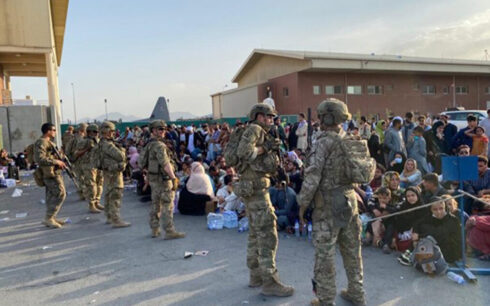Washington, D.C. – A comprehensive report from the U.S. House Foreign Affairs Committee, chaired by Representative Michael McCaul, delivers a sharp critique of the Biden-Harris administration’s handling of the 2021 withdrawal from Afghanistan. The report, titled “Willful Blindness: An Assessment of the Biden-Harris Administration’s Withdrawal from Afghanistan and the Chaos that Followed,” describes a series of failures that it claims led to a catastrophic evacuation, a humanitarian disaster, and long-lasting damage to U.S. national security.
The investigation, spanning over a year, gathers testimony from military officials, intelligence personnel, and individuals directly involved in the evacuation effort. The findings point to poor planning, ignored warnings, and the collapse of key logistical processes that contributed to one of the most chaotic U.S. military operations in recent history.
Key Findings
1. Failure to Plan and Execute a Noncombatant Evacuation
One of the most damning elements of the report is its portrayal of the administration’s failure to adequately plan for a Noncombatant Evacuation Operation (NEO). According to the report, the State Department, under the direction of Secretary Antony Blinken, delayed critical steps to prepare for the withdrawal. Intelligence agencies had warned months earlier that the Afghan government could collapse, but those warnings were either ignored or downplayed.
The decision to keep the U.S. embassy in Kabul open until the last possible moment, despite growing security threats, significantly delayed the evacuation of both U.S. citizens and Afghan allies. When Kabul fell to the Taliban on August 15, 2021, the resulting chaos overwhelmed U.S. forces and led to widespread panic at Hamid Karzai International Airport, where desperate Afghans swarmed planes, and harrowing images of people clinging to aircraft became symbols of the failed withdrawal.
The report notes that a properly executed NEO could have saved lives and prevented much of the chaos. In particular, the lack of preparation meant that crucial time was lost in securing the airport and establishing safe evacuation corridors. As a result, the evacuation devolved into a rushed and disorganized scramble.
2. The Abbey Gate Attack
The August 26, 2021, suicide bombing at Abbey Gate in Kabul, which killed 13 U.S. servicemembers and over 170 Afghan civilians, is a focal point of the report. Intelligence reports had warned of an imminent attack at the airport, but the administration’s response was criticized as insufficient.
According to the report, military commanders had identified the suicide bomber before the attack occurred, but did not receive authorization to engage. The report harshly criticizes the failure to act on these warnings, describing it as one of the most tragic and preventable events of the evacuation.
In the aftermath of the bombing, evidence was destroyed, including sensitive materials such as hard drives and servers. This destruction has hindered further investigations into the attack and limited the ability of the U.S. government to hold responsible parties accountable. The report emphasizes that this lapse in security, coupled with the failure to protect U.S. personnel and Afghan civilians, underscores the disorganization and confusion that characterized the withdrawal.
3. Abandonment of Afghan Allies
One of the most scathing critiques in the report is directed at the Biden administration’s handling of Afghan allies who had assisted U.S. forces during the 20-year conflict. The Special Immigrant Visa (SIV) program, designed to grant visas to Afghans who worked with U.S. personnel, was plagued by bureaucratic delays. Despite assurances that Afghan allies would not be abandoned, over 90% of SIV-eligible applicants were left behind when U.S. forces withdrew.
These Afghans, many of whom served as interpreters, advisers, and support staff, now live under constant threat from the Taliban. The report calls the abandonment of Afghan allies a moral failure and a betrayal of those who risked their lives to assist U.S. forces. Testimony from U.S. veterans who worked closely with Afghan nationals reveals deep frustration and anger over how the withdrawal was handled, with many feeling that their efforts were disregarded in the final days of the war.
4. Long-Term National Security Threats
The report warns that the withdrawal has severely damaged U.S. national security interests, both in the region and globally. With the Taliban now in control of Afghanistan, terrorist groups such as al-Qaeda and ISIS-K have re-established a foothold in the country. Afghanistan has become a haven for extremist groups, as evidenced by the presence of al-Qaeda leader Ayman al-Zawahiri in Kabul, where he was killed in a U.S. drone strike in 2022.
The House Foreign Affairs Committee highlights the threat posed by the Taliban’s access to U.S. military equipment left behind during the withdrawal. Billions of dollars’ worth of advanced weapons and vehicles were not destroyed or removed, and there are concerns that these assets could be used to further destabilize the region.
In addition, the Taliban has gained access to sensitive biometric data left behind by U.S. forces. This data, which includes information on former Afghan government officials and military personnel, has reportedly been used by the Taliban to target and persecute those who worked with the U.S.-backed Afghan government.
5. Military Morale and Recruitment
The report also underscores the significant damage to U.S. military morale and recruitment following the withdrawal. The fall of Kabul and the ensuing chaos have been compared to the fall of Saigon, with many servicemembers feeling disillusioned by the abrupt end to the conflict and the lack of clarity around the mission’s conclusion.
According to the report, confidence in U.S. military leadership has reached a 20-year low, with a growing number of servicemembers questioning the strategic decisions made by their superiors. The emotional toll on veterans of the Afghanistan war has been severe, with many feeling that the sacrifices made over two decades were squandered in the final days of the conflict.
The withdrawal has also had a chilling effect on military recruitment, with potential recruits citing the chaotic end to the war as a factor in their decision not to join the armed forces. The report warns that this decline in recruitment could have long-term consequences for the readiness and capability of the U.S. military.
Humanitarian Fallout
Beyond the immediate military and security implications, the report details the humanitarian catastrophe that has unfolded in Afghanistan since the Taliban regained power. Women and girls, who had made significant strides in education and employment during the U.S. presence in Afghanistan, have seen their rights stripped away under Taliban rule. The report describes the return of forced marriages, the denial of education to girls, and the exclusion of women from the workforce as key indicators of the worsening human rights situation.
Ethnic and religious minorities, particularly the Hazara community, have faced violent persecution. The report calls for increased international attention to the plight of Afghan civilians, warning that without concerted global action, the situation will continue to deteriorate.
Conclusion
The “Willful Blindness” report calls for further investigation into the Biden-Harris administration’s handling of the withdrawal and emphasizes the need for accountability at the highest levels of government. The committee urges Congress to implement safeguards to prevent future U.S. military operations from ending in similar disaster.
As the humanitarian and security crises in Afghanistan continue to unfold, the report serves as a reminder of the long-term consequences of U.S. foreign policy decisions. The Biden administration has yet to issue a formal response to the findings, but the report is likely to fuel ongoing debates over the legacy of the Afghanistan war and the U.S. withdrawal.





